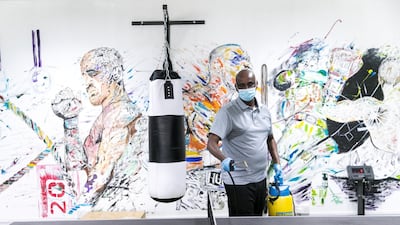The coronavirus pandemic led to a reduction in serious crimes and a smaller prison population, the UAE Minister of Interior said.
Only 34 "worrying crimes" were recorded last year, compared with 49 in 2019, 78 in 2018 and 89 in 2016. These could include offences such as murder, rape and drug-dealing.
He did not include figures for minor crimes.
Sheikh Saif bin Zayed spoke on Tuesday at the Federal National Council, where members asked how police and prisons had handled the pandemic.
“In the beginning of the pandemic everybody expected crime to rise – however, the UAE managed to maintain a low rate,” said Sheikh Saif, who is also Deputy Prime Minister.
“During lockdown, we expected fires to increase since people were spending more time at home.
"But, thank God, and due to the public’s high level of awareness, we were surprised that fires dropped from 700 in 2019 to 381 in 2020.”
There were also fewer road casualties.
The minister, who oversees all the UAE's police forces and jails, said only 4 per cent of the prison population caught Covid-19.
In contrast, about 20 per cent of inmates in the US were estimated to have caught the virus, a result of serious overcrowding.
"Soon we will celebrate reaching zero cases” among inmates, Sheikh Saif said.
As police revealed last year, hundreds of prisoners were released early and returned home to cut prison numbers.
Sheikh Saif did not give a figure for the total prison population, but said the number of prisoners fell 21.6 per cent.
He said 6,039 prisoners were pardoned and others left on the completion of their sentences.
A total of 10,394 airline tickets were donated by the Ministry of Interior, the General Civil Aviation Authority and the Emirates Red Crescent. These allowed former inmates of 98 nationalities to return to their home countries.
Other measures that helped achieve such a low rate of infections in prison included placing new inmates in quarantine for 15 days before admitting them to the general cells.
Deep sanitisation was carried out regularly inside prisons and guidance on how to avoid the virus was circulated among inmates in many languages.
In addition, more than 5,500 inmates were vaccinated against Covid-19.
Inmates also helped in the country's fight against the pandemic, producing 17,600 face masks and 30,000 face shields that were distributed free of charge to labourers.
“We made the inmates feel they are productive in the fight against Covid-19, and we did not disrupt procedures," Sheikh Saif said.
Trials and visits were held online to allow inmates access to lawyers, court proceedings and their families.
















